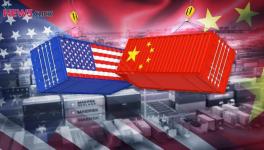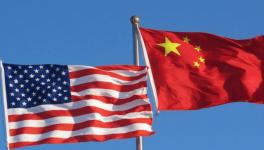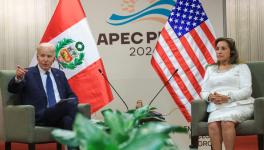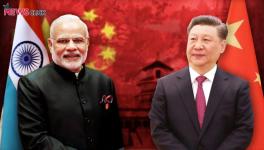Waning Mutual Trust Afflicts China-US Trade Deal
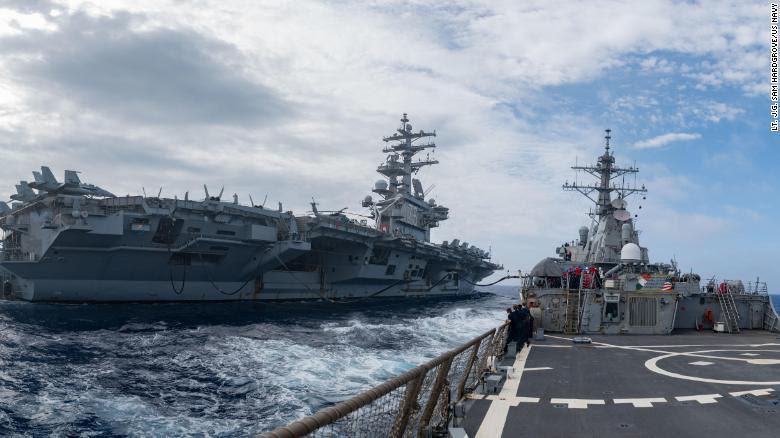
The guided-missile destroyer USS Barry operates with the aircraft carrier USS Ronald Reagan in the Philippine Sea on May 30, 2020.
If there is one template on which the Carnegie Endowment for International Peace, CNN, New York Times, Washington Post can agree with China’s Xinhua news agency and the CGTN in the present-day world of information wars, it must be in their shared opinion that Mike Pompeo is the worst secretary of state in America’s diplomatic history. (here, here, here, here, and here)
Two Chinese flagships came out yesterday with a similar opinion on Pompeo—China Daily, the government paper and People’s Daily, the Party organ—lamenting his dishonesty, unscrupulousness, and untrustworthiness as a politician and human being.
The China Daily/People’s Daily articles have appeared just 10 days after Pompeo took the initiative to invite Yang Jiechi, Politburo member, and China’s top diplomat, on a delicate ‘Kissingerian’ mission to draw red lines on the sand in the Sino-American relationship.
Pompeo hoped to pin down Beijing to fulfilling its commitments under the trade deal of last January that includes China’s massive purchase of agricultural products from the US. It is a critically important issue for Trump personally in the upcoming election in November. The farm lobby is his ‘core constituency’.
Where exactly Pompeo goofed up in his mission is hard to tell, but the American diplomats apparently went into the negotiations with Yang under the impression that they could extract concessions by taunting/threatening Beijing over Hong Kong, Taiwan, and Xinjiang.
In fact, Trump signed the new legislation calling for sanctions over the repression of China’s Uighurs just as Pompeo received Yang. (On June 25, the US Senate approved a bill over the Hong Kong security law that would allow the US to impose sanctions against Hong Kong police, Chinese officials, and banks.)
Pompeo was apparently bullish that China is a much weakened and diminished power today due to the impact of the Covid-19 pandemic on its economy, politics, and international standing and that the negative fallouts would have damaged the prestige of the Chinese communist party and its leadership.
But, on the contrary, Beijing’s reaction to the talks in Hawaii has been very sharp. Yang firmly rejected Pompeo’s demarche on Hong Kong, Taiwan, and Xinjiang, as the Foreign Ministry spokesman’s readout suggests.
Unsurprisingly, the State Department readout was taciturn and evasive. In a subsequent media briefing, however, a senior state department official virtually admitted that Pompeo’s mission was a failure.
Also read: Standoff in Ladakh Needs Political Solution
In fact, Pompeo himself switched back quickly to his wolf warrior diplomacy almost immediately after leaving Hawaii by launching a withering attack on China in a speech at Copenhagen on June 19, four subsequent statements exclusively on China (here, here, here and here) and yet another full-bodied speech in Brussels on June 25.
Pompeo is increasingly behaving like a man possessed. He may have a game plan to divert attention from the failure of his mission to Hawaii but such erratic, excessive behaviour by a US secretary of state is extraordinary even by the Cold-War era yardstick.
At any rate, on June 26, Wall Street Journal may have offered a plausible explanation for all this adrenaline flow. The daily disclosed in a report that Beijing has started to “quietly” warn Washington that China’s purchases under the “Phase One” trade deal of January, which include American agricultural products, could altogether cease if the US crosses “red lines” – that is, if the Trump administration meddles in issues that the Chinese government deems as “off limits”.
The daily added citing anonymous officials that Yang relayed this warning to Pompeo at the Hawaii meeting. “The US side should refrain from going too far with meddling. Red lines shouldn’t be crossed,” an anonymous Chinese official told the WSJ.
On June 26, Chinese Communist Party’s tabloid Global Times also featured a commentary to the effect that Trump’s team should “show more goodwill or positive signals to offset the impact” of their irresponsible statements regarding China “so as to prevent further losses in the market arising from such uncertainty”.
The GT said the trade deal is not the only issue in the bilateral relations “that requires efforts to eliminate doubts and concerns. The US government needs to reflect on all the battlegrounds it has opened against China in recent months” such as the crackdown on Chinese high-tech companies like Huawei, the US threat of revoking Hong Kong’s special trade status, and its spat over flight resumptions.
The commentary concluded that “only by reflecting on and making efforts to remedy the damage that has been caused to US-China relations on multiple fronts can bilateral economic and trade ties return to a normal track”.
Equally, China has sharpened its stance on the recent US overflights in Taiwan, Washington’s reported move on weapons sales to Taipei, Pompeo’s campaign to allow Taiwan to be represented in the WHO as a separate state and so on.
The Global Times disclosed that the Chinese People’s Liberation Army [PLA] sent military aircraft to Taiwan’s southwestern airspace eight times in June alone. It explained that apart from reconnaissance missions and aimed at intercepting US military aircraft flying through the area, the PLA is also “training to suppress the potential US and Japanese reinforcements coming from Guam and Ryukyu Islands through the Miyako Strait east of Taiwan and through the Bashi, Balintang, and Babuyan channels southwest of Taiwan.”
The report flagged that “the PLA could use these operations to effectively lockdown the area from foreign forces while ensuring that Taiwan’s forces cannot escape”.
Clearly, to borrow a cliche among China hands, Beijing is being more “assertive” than before. What explains it? Is it motiveless malignity, or, as many Indian and American analysts tend to believe, an attempt to cover up China’s weakness?
In reality, China is reacting to a series of calibrated actions by the US through the past several months to irritate it, taunt it, humiliate it and threaten it. The deployment of three 100,000-ton US Navy aircraft carriers to the Pacific Ocean for the first time in three years is the latest such move. China is not blinking, but the damage is done nonetheless.
The US’ provocative moves triggered tensions in the relationship. And now they are backfiring. From such a perspective, China’s “assertiveness” turns out to be deterrence — rather than intended aggression — in a security climate where mutual trust has broken down for whatever reasons.
Get the latest reports & analysis with people's perspective on Protests, movements & deep analytical videos, discussions of the current affairs in your Telegram app. Subscribe to NewsClick's Telegram channel & get Real-Time updates on stories, as they get published on our website.









